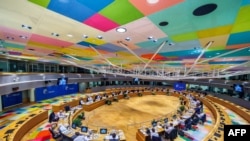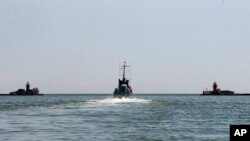The chairperson of the African Union, Senegal's President Macky Sall, has warned European Union leaders that Russian blockade of Ukraine's ports is setting the stage for a "catastrophic scenario" of severe shortages and price increases throughout Africa.
"On behalf of the African Union, I thank the European Leaders who associated me with the European Council meeting to discuss solutions to the food crisis caused by the war in Ukraine, which is impacting Africa. The AU will continue its consultation with the EU," Sall tweeted.
The Russian Black Sea Fleet is blocking Ukrainian seaports, limiting the country's shipments of crucial items such as grain and oil. This has put world food security at risk.
Sall's call comes as European Union leaders are concluding a two-day summit Tuesday aimed to find solutions for energy, defense, and food security - key issues with the war in Ukraine.
Sall added that a halt to food and fertilizer exports across the Black Sea is extremely concerning for a continent with 282 million people who are undernourished. According to him, fertilizer prices in Africa have already tripled since 2021.
African countries imported 44% of their wheat from Russia and Ukraine between 2018 and 2020, according to U.N. figures. The African Development Bank is already reporting a 45% increase in wheat prices on the continent, making everything from couscous in Mauritania to the fried donuts sold in Congo more expensive for customers.
“According to some estimates, cereal yields in Africa will fall by 20 to 50 percent this year,” Sall said. “We would like to see everything possible done to free up available grain stocks and ensure transportation and market access.”
Foreign Minister Sergey Lavrov said Tuesday that Russia guarantees “free export of Ukrainian grain by ships that are now locked in Ukrainian ports,” but first Ukraine needs to “de-mine the coastal waters that are in the territorial sea of Ukraine.”
Charles Michel, the EU Council president, said that “the EU is sparing no efforts to free Ukraine’s exports over land and exploring alternative sea routes.”

